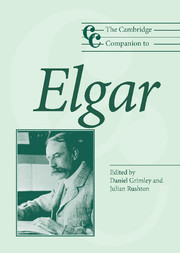Book contents
- Frontmatter
- 1 Introduction
- 2 Elgar and his British contemporaries
- 3 Elgar and his publishers
- 4 Magic by mosaic: some aspects of Elgar's compositional methods
- 5 Elgar's musical language: the shorter instrumental works
- 6 The early choral works
- 7 Elgar's later oratorios: Roman Catholicism, decadence and the Wagnerian dialectic of shame and grace
- 8 Roman Catholicism and being musically English: Elgar's church and organ music
- 9 ‘A smiling with a sigh’: the chamber music and works for strings
- 10 In search of the symphony: orchestral music to 1908
- 11 The later orchestral music (1910–34)
- 12 Elgar's unwumbling: the theatre music
- 13 Elgar and recording
- 14 Broadcasting's ally: Elgar and the BBC
- 15 Elgar in German criticism
- 16 Functional music: imperialism, the Great War, and Elgar as popular composer
- Notes
- Select bibliography
- Index
12 - Elgar's unwumbling: the theatre music
Published online by Cambridge University Press: 28 September 2011
- Frontmatter
- 1 Introduction
- 2 Elgar and his British contemporaries
- 3 Elgar and his publishers
- 4 Magic by mosaic: some aspects of Elgar's compositional methods
- 5 Elgar's musical language: the shorter instrumental works
- 6 The early choral works
- 7 Elgar's later oratorios: Roman Catholicism, decadence and the Wagnerian dialectic of shame and grace
- 8 Roman Catholicism and being musically English: Elgar's church and organ music
- 9 ‘A smiling with a sigh’: the chamber music and works for strings
- 10 In search of the symphony: orchestral music to 1908
- 11 The later orchestral music (1910–34)
- 12 Elgar's unwumbling: the theatre music
- 13 Elgar and recording
- 14 Broadcasting's ally: Elgar and the BBC
- 15 Elgar in German criticism
- 16 Functional music: imperialism, the Great War, and Elgar as popular composer
- Notes
- Select bibliography
- Index
Summary
In the nineteenth and early twentieth centuries (before the advent of film) it was not unusual for theatrical productions to be accompanied by elaborate musical scores. Although it accounts for only a small part of Elgar's output, his contribution to the tradition was nevertheless creatively significant. Any study of Elgar's theatre music should focus principally on The Starlight Express, his finest theatre piece, and by far the longest. He said it was the kind of piece he had waited a generation to set. But it must more generally be a study of his musical concerns c.1914–18, the period in which he wrote six of the ten theatre pieces, and the end of his modernist period of composition from In the South to Falstaff. Yet one cannot account for it all along those lines.
Peacetime potboilers
Initially, Elgar hoped his theatre music would provide a captive audience on which to try ideas for more serious works, as well as to raise money. His first commission (in 1901) was for incidental music for the play Diarmuid and Grania, a collaboration between George Moore and W. B. Yeats. (Elgar modernised the title to Grania and Diarmid). After the play's run, Moore pestered Elgar with grander projects: ‘The sooner you begin writing the [Grania] opera the better[:] the subject evidently suits you.’ But Elgar did not bite, nor did he care whether the play was revived.
- Type
- Chapter
- Information
- The Cambridge Companion to Elgar , pp. 171 - 183Publisher: Cambridge University PressPrint publication year: 2005



